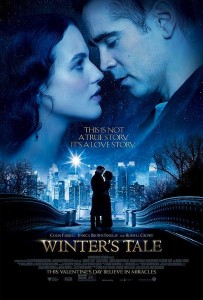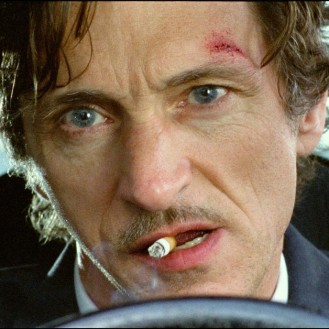There should be entertainment in watching something as expensive and clueless as Winter’s Tale foul up as bad as it does. To do so, there has to be peculiar performances or unusual story elements to keep us guiltily hooked. Winter’s Tale has these, but it’s empty core covers any unintentional laughs. It’s a film serviced by a writer/director who can’t fully comprehend the source material he’s adapting.
Akiva Goldsman has been a producer on many films and even won an Oscar for his producing efforts on A Beautiful Mind. Since then, he’s been attached to many big blockbusters. It’s a bit of an odd choice to give him a sentimental flick like Winter’s Tale for his first foray into directing feature films. It’s a movie that primarily involves gentle romance expanding across different time periods. Maybe his Beautiful Mind cred did too much talking during pre-production, or maybe the fights and religious figures Mark Helprin’s novel deals with clouded his logic.
Goldsman not only directs Winter’s Tale, he also wrote the screenplay and – wouldn’t you know it – produced the film. However, it feels as if he dons his producer’s cap more than his director’s hat. And, his screenwriter’s chapeau hasn’t been touched from the coat rack it’s hung on.
The production is filled to the brim with extravagance through costuming and its alluring cinematography while a sweeping score plays over top. It’s a movie that has a very attractive shell with capable actors looking the part. As a producer, Goldsman knows what looks good on the screen and what should enter the frame to get the audience to feel certain things, thus, further reeling them into the film.
That said, a trusty producer needs a director with a vision and an easy personable connection to their performers. Goldsman doesn’t have these qualifications as a filmmaker. WInter’s Tale isn’t helmed by a cocky individual, but Goldsman’s got business on the mind and he thinks he knows how to manipulate his audience. But, he’s unclear that genuine evidence behind each action is what makes these emotions last.
Every actor is baffled because they’ve been given hardly any direction or insight into their role. This means movie goers receive underplayed performances (such as Colin Farrell’s portrayal of the film’s leading burglar/lover) or actors throwing everything – including the kitchen sink – at the audience (cue Russell Crowe’s off-kilter turn as a husky demonic servant who slips in and out of an Irish accent). Goldsman can dress them up, but he can’t tell them how to dance.
The script suffers similar problems with Goldsman drawing blanks when connecting key scenes or motivations, as well as blaming things on mystical magic whenever he encounters a dead end he can’t explain. The dialogue is also dripping with goops of sappy, derivative, gag-tickling lovings as Farrell and his romantic interest (played by Jessica Brown Findlay) look into each other’s eyes and read off sweet nothings that could give your dentist a mouthful of cavities.
In the mid-90’s, this maybe could’ve eked by as a less-than-par adult drama from Miramax. But presently, Akiva Goldsman’s Winter’s Tale may be pretty on the outside, but it doesn’t stop it from being completely lifeless internally.





Be the first to comment